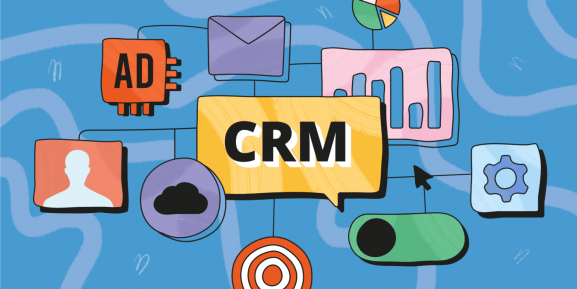To keep up with the immense demand faced by modern businesses, having a custom CRM is more important than ever before. Custom CRMs will allow your business to significantly improve operational efficiency.
However, the initial shift to a custom CRM or a different one can be a bit challenging. That’s why it’s essential to engage in data migration best practices. Through these practices, you can ensure a seamless CRM data migration.
Without further ado, here are five essential tips to help ensure a seamless CRM data migration:
Create a Thorough Plan
The key component of any successful operation is a well-thought-out plan. The data migration will be chaotic without proper planning for the future. It’s essential that you categorize all the key CRM data exports that you must transfer to the new platform.
The plan should ideally start with you exploring the CRM market and doing the necessary research. Go through the options and assess which one fits your business needs the most. Additionally, look through your industry for what other businesses are using and try reaching out to your network to understand their experience.
Analyze Your Data and Prep for Migration
Next, identify all the data you want to migrate and the level of quality you desire. Be certain to map out the fields properly and confirm that these parameters exist within your desired CRM.
Furthermore, you need to identify all the key stakeholders that are going to be involved in the data migration procedure. These people are the ones who are going to be responsible for ensuring that the whole process runs smoothly.
After identifying all the data that you’ll be transferring, you need to assess where the CRM data import will be stored in the new system. Everything needs to be placed in the correct depository so future users don’t have issues finding the required data.
Pick the Right CRM Migration Tool
Before engaging in the migration, you must provide your developers with the correct tool for the job. There are plenty of different options to choose from, but it’s essential to go with the one that meets your needs the most. You must consult with your developers on this matter because they’re the ones who’ll be front and center in the migration.
Ideally, before you begin the main migration procedure, you should test out the effectiveness of the migration tool that you use! You can do this by picking a small dataset and then seeing how the migration for that portion occurs. That way you’ll be able to identify any potential issues that arise.
Start Training Right Away
Even after you finish the migration successfully, the job’s not finished. After migrating the data to the new CRM, it’s important that your users understand how to utilize the system properly. If they don’t adapt and learn the new technology thoroughly, then no matter how successful the migration, it ultimately won’t last for very long.
Ideally, you should hold sessions as the migration is in process, to start familiarizing your users with the new CRM. Speed is your ally in this situation, the quicker your employees can get used to the new technology, the more likely it is that the migration will be a sustained success.
Review Regularly
Once you reach the post-migration stage, then it becomes about regular maintenance to ensure that the CRM system works efficiently. Regular users of the CRM should provide feedback on the functionality and the overall performance of the CRM.
Take that feedback into account and make the necessary adjustments to showcase to the employees that their input is valued. That way you’ll ensure that you can improve the system, optimize the experience, and help your business reach the next level.
Risks Associated With CRM Data Migration
Now that you fully understand the best practices to follow when engaging in CRM data migration, it’s also important to understand the risks associated with the procedure. Here are all the main risks that you should be primarily concerned about.
Data Loss
The main concern that comes with moving from one CRM platform to another is data loss. If you don’t carefully map out all the data before the migration, some data may get lost in translation. That’s why the planning process is super important. You need to engage in effective CRM data cleaning to ensure that all the important data makes it onto the next platform.
Data Quality Issues
Even if you account for data loss, it’s still possible that there might be problems with the overall quality of the data. If the data you migrate is inaccurate or inconsistent, it would potentially lead to poor decision-making. Poor decision-making will slowly take away from your business and lead to losses in the future.
Security Breaches
Data migration is something that’s unavoidable when you’re thinking of shifting to a new CRM platform. During the migration, it’s essential that you take the necessary precautions to protect customer data. In the case of a security breach, all your sensitive data will be at risk of being exposed, which could also land you in trouble with data compliance protocols.
System Downtime
Another risk associated with data migration is the stoppage in business operations that you’ll experience. As your platform is in the process of migration, you won’t be able to continue with your business operation until the migration is complete. Consequently, you need to ensure that you prepare in advance for this downtime!
User Adoption Challenges
In the case of a successful migration, you must feel like you’re ready to reach the next level. However, if the users don’t feel comfortable using the new platform, you’re in for a world of trouble. That’s why it’s more important than ever before to ensure that you have proper training procedures in place before you begin the migration.
These are the main risks that you’ll encounter when performing a data migration. It’s important to keep all these factors in mind when trying to migrate to a new CRM platform.
Conclusion
CRM data migration can be a tricky situation for a company. However, it’s a very necessary risk to take as the migration to a new CRM platform could help get your business to the next level.
However, due to the sensitive nature of the procedure, it’s important that you build a proper data migration checklist and take every step carefully.
If you’re worried about the sensitive nature of the task, or want to conduct a SugarCRM to SuiteCRM migration feel free to reach out. RT Dynamic has years of experience in assisting businesses with CRM migration and implementation!
We’ll handle the migration so you can focus on getting the maximum possible growth out of your business!



